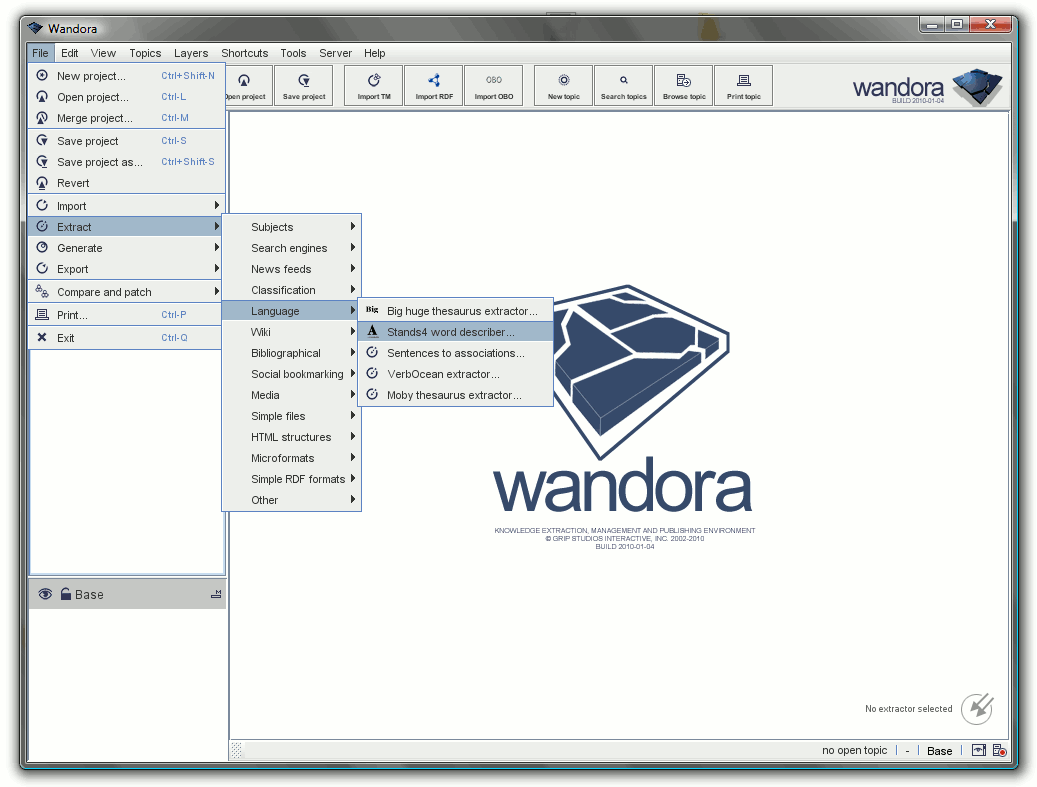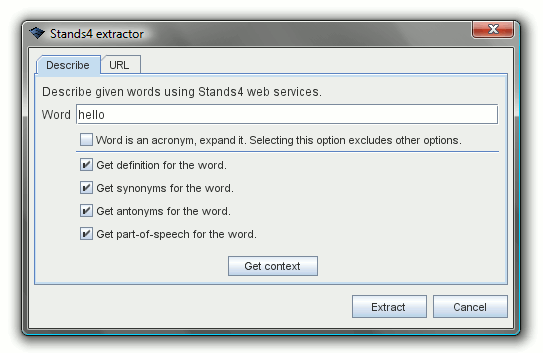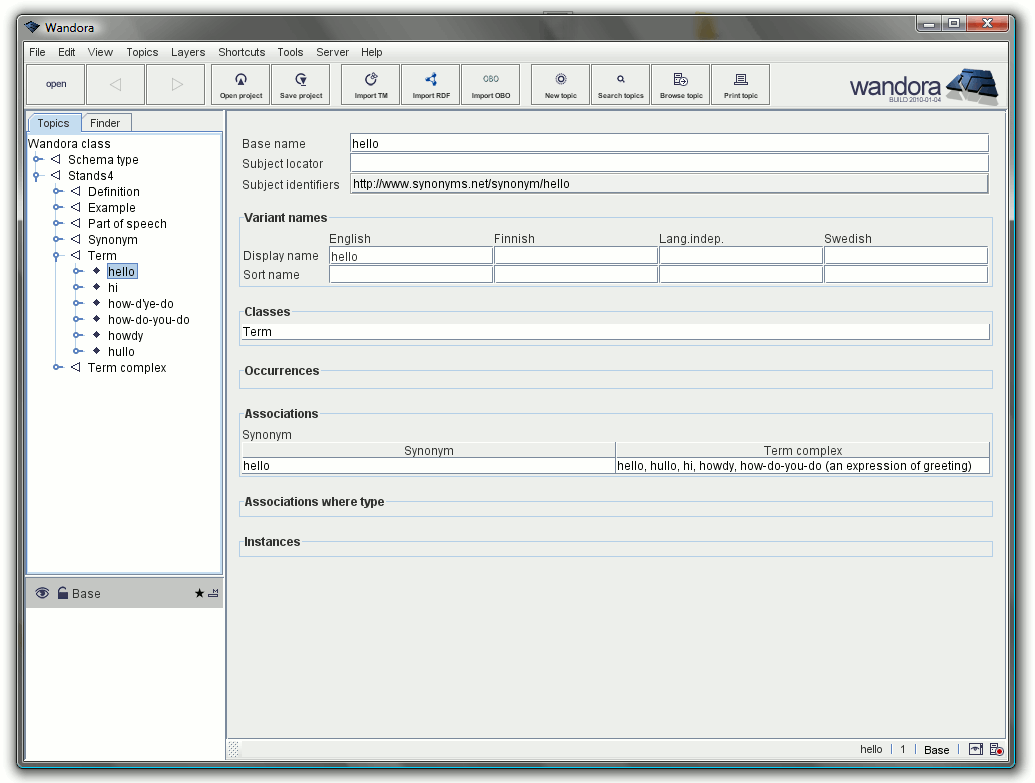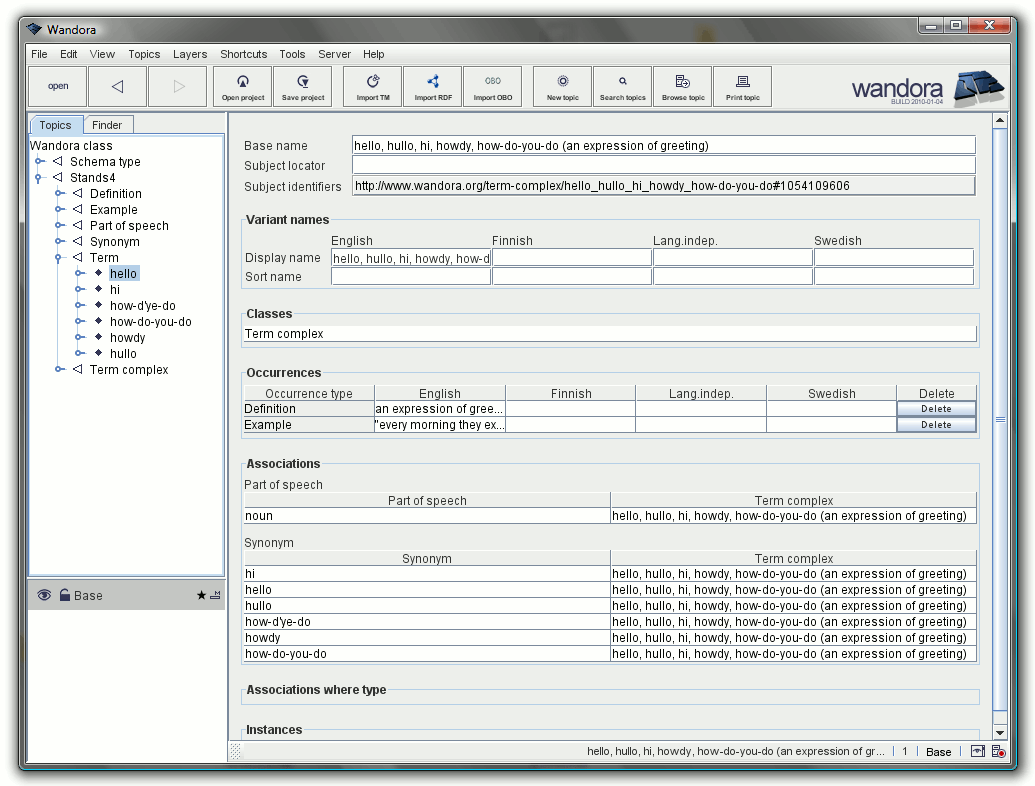Stands4 word describer
(→Example) |
|||
| (5 intermediate revisions by one user not shown) | |||
| Line 1: | Line 1: | ||
Wandora's '''Extract > Language > Stands4 word describer''' is used to describe given word with associations and occurrences provided by external web service [http://www.abbreviations.com/ STANDS4 API]. STANDS4 API provider, STANDS4 LLC is a leading provider of free online reference resources, serving millions of unique visitors worldwide with genuine content through its network of reference websites and content partners. Wandora's word describer requests a key for STANDS4 API. You can request your personal apikey [http://www.abbreviations.com/api.asp here]. Wandora doesn't store apikeys between use sessions. | Wandora's '''Extract > Language > Stands4 word describer''' is used to describe given word with associations and occurrences provided by external web service [http://www.abbreviations.com/ STANDS4 API]. STANDS4 API provider, STANDS4 LLC is a leading provider of free online reference resources, serving millions of unique visitors worldwide with genuine content through its network of reference websites and content partners. Wandora's word describer requests a key for STANDS4 API. You can request your personal apikey [http://www.abbreviations.com/api.asp here]. Wandora doesn't store apikeys between use sessions. | ||
| − | Describing associations are synonym, antonyms, and part-of-speech. Describing occurrences are definition and example. '''Stands4 word describer''' can also expand acronyms. What is interesting in STANDS4 descriptions, is the use of '''concepts''' or '''term-complexes''' as they are called in Wandora extractions. The idea is that describing, say a term '''hello''' doesn't describe generated term topic '''hello''' with direct associations to it's synonyms such as '''hi''' or '''howdy''' but a concept of '''"hello, hullo, hi, howdy, how-do-you-do (an expression of greeting)"''', and this concept is then associated to all synonyms | + | Describing associations are ''synonym'', ''antonyms'', and ''part-of-speech''. Describing occurrences are ''definition'' and ''example''. '''Stands4 word describer''' can also expand acronyms. What is interesting in STANDS4 descriptions, is the use of '''concepts''' or '''term-complexes''' as they are called in Wandora extractions. The idea is that describing, say a term '''hello''' doesn't describe generated term topic '''hello''' with direct associations to it's synonyms such as '''hi''' or '''howdy''' but a concept of '''"hello, hullo, hi, howdy, how-do-you-do (an expression of greeting)"''', and this concept is then associated to all synonyms. |
== Example == | == Example == | ||
| Line 19: | Line 19: | ||
[[Image:Stands4api_example3.gif|center]] | [[Image:Stands4api_example3.gif|center]] | ||
| − | '''Hello''' topic is associated to a term-complex i.e. a concept called '''hello, hullo, hi, howdy, how-do-you-do (an expression of greeting)''' representing an expression of greeting. User double clicks the concept topic and it is opened to the topic panel of Wandora application as shown below. Concept topic is associated not only to a term topic '''hello''' but also to all synonyms. Wandora user should note that | + | '''Hello''' topic is associated to a term-complex i.e. a concept called '''hello, hullo, hi, howdy, how-do-you-do (an expression of greeting)''' representing an expression of greeting. User double clicks the concept topic and it is opened to the topic panel of Wandora application as shown below. Concept topic is associated not only to a term topic '''hello''' but also to all synonyms. Wandora user should note that ''definition'' and ''example'' are occurrences of ''concept'' topic, not ''term'' topics. Term may have multiple different meanings in different contexts, and attaching definition directly to the term would cause difficulties in distinguishing these different meanings. |
[[Image:Stands4api_example4.gif|center]] | [[Image:Stands4api_example4.gif|center]] | ||
Latest revision as of 09:47, 18 May 2010
Wandora's Extract > Language > Stands4 word describer is used to describe given word with associations and occurrences provided by external web service STANDS4 API. STANDS4 API provider, STANDS4 LLC is a leading provider of free online reference resources, serving millions of unique visitors worldwide with genuine content through its network of reference websites and content partners. Wandora's word describer requests a key for STANDS4 API. You can request your personal apikey here. Wandora doesn't store apikeys between use sessions.
Describing associations are synonym, antonyms, and part-of-speech. Describing occurrences are definition and example. Stands4 word describer can also expand acronyms. What is interesting in STANDS4 descriptions, is the use of concepts or term-complexes as they are called in Wandora extractions. The idea is that describing, say a term hello doesn't describe generated term topic hello with direct associations to it's synonyms such as hi or howdy but a concept of "hello, hullo, hi, howdy, how-do-you-do (an expression of greeting)", and this concept is then associated to all synonyms.
[edit] Example
In this example Wandora user describes a word hello using Wandora's Stands4 word describer. First, user starts the describer selecting menu option Extract > Language > Stands4 word describer as shown below.
Wandora opens up a dialog where user can enter the word and change options for description process.
Then user clicks Extract button. If user is describing his/her first word Wandora request an apikey for STANDS4 API. You can request your personal apikey here. Wandora performs an api call, receives a description for the hello, and transforms the description to Topic Maps structures i.e. topics and associations.
Next Wandora user opens one of generated topics, called hello as shown below.
Hello topic is associated to a term-complex i.e. a concept called hello, hullo, hi, howdy, how-do-you-do (an expression of greeting) representing an expression of greeting. User double clicks the concept topic and it is opened to the topic panel of Wandora application as shown below. Concept topic is associated not only to a term topic hello but also to all synonyms. Wandora user should note that definition and example are occurrences of concept topic, not term topics. Term may have multiple different meanings in different contexts, and attaching definition directly to the term would cause difficulties in distinguishing these different meanings.
[edit] See also
Wandora features also a Big Huge Thesaurus API extractor which is similar to Stands4 word describer but has no concept dimension.



